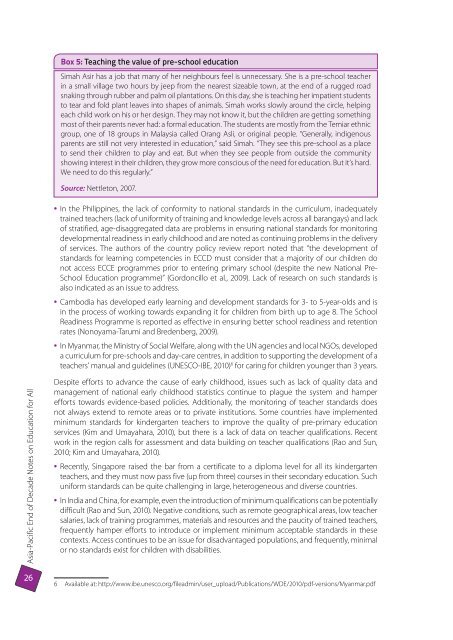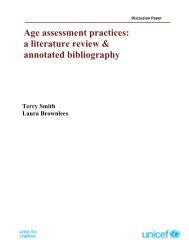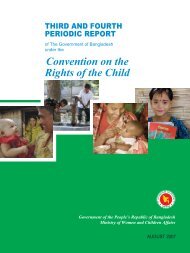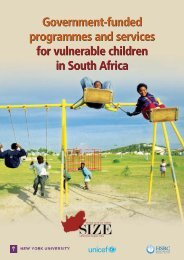EFA Goal 1: Early childhood care and education; Asia ... - Unicef
EFA Goal 1: Early childhood care and education; Asia ... - Unicef
EFA Goal 1: Early childhood care and education; Asia ... - Unicef
Create successful ePaper yourself
Turn your PDF publications into a flip-book with our unique Google optimized e-Paper software.
Box 5: Teaching the value of pre-school <strong>education</strong><br />
Simah Asir has a job that many of her neighbours feel is unnecessary. She is a pre-school teacher<br />
in a small village two hours by jeep from the nearest sizeable town, at the end of a rugged road<br />
snaking through rubber <strong>and</strong> palm oil plantations. On this day, she is teaching her impatient students<br />
to tear <strong>and</strong> fold plant leaves into shapes of animals. Simah works slowly around the circle, helping<br />
each child work on his or her design. They may not know it, but the children are getting something<br />
most of their parents never had: a formal <strong>education</strong>. The students are mostly from the Temiar ethnic<br />
group, one of 18 groups in Malaysia called Orang Asli, or original people. “Generally, indigenous<br />
parents are still not very interested in <strong>education</strong>,” said Simah. “They see this pre-school as a place<br />
to send their children to play <strong>and</strong> eat. But when they see people from outside the community<br />
showing interest in their children, they grow more conscious of the need for <strong>education</strong>. But it’s hard.<br />
We need to do this regularly.”<br />
Source: Nettleton, 2007.<br />
In the Philippines, the lack of conformity to national st<strong>and</strong>ards in the curriculum, inadequately<br />
trained teachers (lack of uniformity of training <strong>and</strong> knowledge levels across all barangays) <strong>and</strong> lack<br />
of stratified, age-disaggregated data are problems in ensuring national st<strong>and</strong>ards for monitoring<br />
developmental readiness in early <strong>childhood</strong> <strong>and</strong> are noted as continuing problems in the delivery<br />
of services. The authors of the country policy review report noted that “the development of<br />
st<strong>and</strong>ards for learning competencies in ECCD must consider that a majority of our children do<br />
not access ECCE programmes prior to entering primary school (despite the new National Pre-<br />
School Education programme)” (Gordoncillo et al., 2009). Lack of research on such st<strong>and</strong>ards is<br />
also indicated as an issue to address.<br />
Cambodia has developed early learning <strong>and</strong> development st<strong>and</strong>ards for 3- to 5-year-olds <strong>and</strong> is<br />
in the process of working towards exp<strong>and</strong>ing it for children from birth up to age 8. The School<br />
Readiness Programme is reported as effective in ensuring better school readiness <strong>and</strong> retention<br />
rates (Nonoyama-Tarumi <strong>and</strong> Bredenberg, 2009).<br />
In Myanmar, the Ministry of Social Welfare, along with the UN agencies <strong>and</strong> local NGOs, developed<br />
a curriculum for pre-schools <strong>and</strong> day-<strong>care</strong> centres, in addition to supporting the development of a<br />
teachers’ manual <strong>and</strong> guidelines (UNESCO-IBE, 2010) 6 for caring for children younger than 3 years.<br />
<strong>Asia</strong>-Pacific End of Decade Notes on Education for All<br />
Despite efforts to advance the cause of early <strong>childhood</strong>, issues such as lack of quality data <strong>and</strong><br />
management of national early <strong>childhood</strong> statistics continue to plague the system <strong>and</strong> hamper<br />
efforts towards evidence-based policies. Additionally, the monitoring of teacher st<strong>and</strong>ards does<br />
not always extend to remote areas or to private institutions. Some countries have implemented<br />
minimum st<strong>and</strong>ards for kindergarten teachers to improve the quality of pre-primary <strong>education</strong><br />
services (Kim <strong>and</strong> Umayahara, 2010), but there is a lack of data on teacher qualifications. Recent<br />
work in the region calls for assessment <strong>and</strong> data building on teacher qualifications (Rao <strong>and</strong> Sun,<br />
2010; Kim <strong>and</strong> Umayahara, 2010).<br />
Recently, Singapore raised the bar from a certificate to a diploma level for all its kindergarten<br />
teachers, <strong>and</strong> they must now pass five (up from three) courses in their secondary <strong>education</strong>. Such<br />
uniform st<strong>and</strong>ards can be quite challenging in large, heterogeneous <strong>and</strong> diverse countries.<br />
In India <strong>and</strong> China, for example, even the introduction of minimum qualifications can be potentially<br />
difficult (Rao <strong>and</strong> Sun, 2010). Negative conditions, such as remote geographical areas, low teacher<br />
salaries, lack of training programmes, materials <strong>and</strong> resources <strong>and</strong> the paucity of trained teachers,<br />
frequently hamper efforts to introduce or implement minimum acceptable st<strong>and</strong>ards in these<br />
contexts. Access continues to be an issue for disadvantaged populations, <strong>and</strong> frequently, minimal<br />
or no st<strong>and</strong>ards exist for children with disabilities.<br />
26<br />
6 Available at: http://www.ibe.unesco.org/fileadmin/user_upload/Publications/WDE/2010/pdf-versions/Myanmar.pdf

















